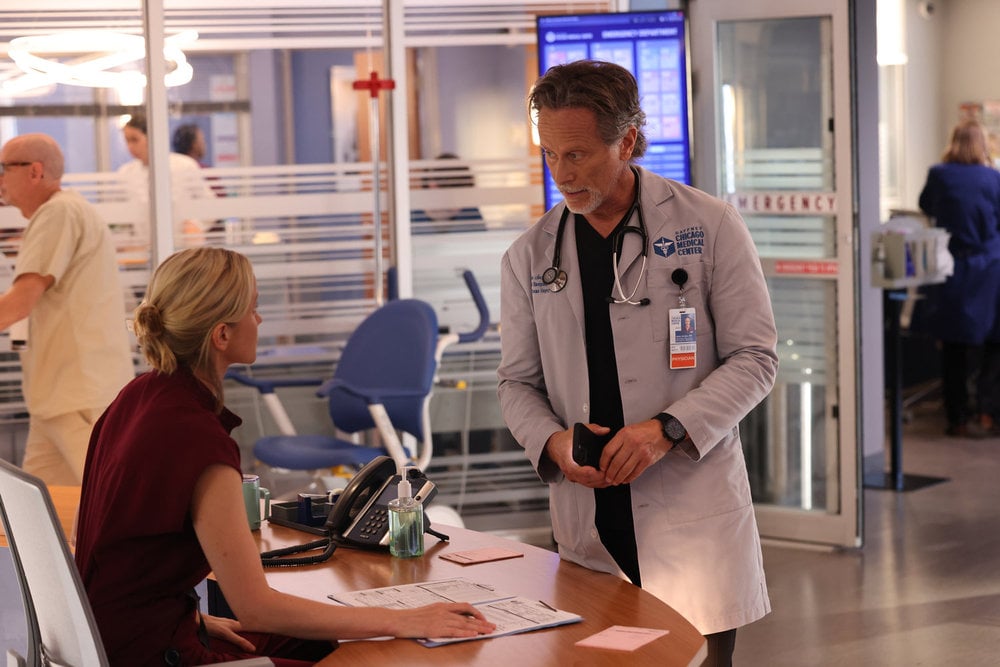I’m glad Hannah isn’t on Chicago Med.
Too often, television addiction is described as something that happens suddenly and leaves a person helpless to the point that they have no choice but to give in, even after years of sobriety.
That’s not the case, and I’m grateful that Chicago Med covered Hannah’s mental health issues in a more sensitive way than this.


Why it’s so important to get Hannah’s mental health issues right
I am often frustrated by how addiction and other mental health issues are portrayed on television.
These issues affect real-life people, and it’s bad when TV shows promote harmful stereotypes or misinformation.
People shouldn’t make life decisions based on what happens on TV, but the truth is, we all learn about how the world works by watching our favorite shows, often without realizing it.
When shows like “Chicago Med” are done well, they can have a positive impact in ways that viewers may never know they have.
People may be inspired to seek help or feel less alone because they see themselves as a fictional character.


How Chicago Med addressed Hannah’s mental health issues
Mader does an almost perfect job of showing the other mental health issues behind Hannah’s temptation to use drugs.
Hanna has been heading toward crisis over the past few episodes, and not just because of Eloise’s death.
It’s one of a million ways her life seems to be falling apart, her relationship with Ripley is falling apart, Lennox questions whether the ER really needs a full-time OB-GYN, and Eloise is even there Refusing to believe her before the tragic events.
Hannah’s downward spiral is carefully written, with one thing building upon another, with past trauma or negative events contributing to the choices she makes.


For example, her need to protect Ripley from self-destructive impulses may come from her knowledge of what she did to herself during the onset of her drug addiction and her desire to ensure that others do not make similar mistakes.
This approach works because it avoids TV clichés about how mental health crises happen and instead builds on Hannah’s past, her present positive intentions, and her frustration at not being heard.
Things reach a boiling point when Héloïse dies, and Hanna tries for nearly an hour to revive her before sinking into guilt and shame at her inability to save the woman.
The aftermath was equally well done. Hannah is the only TV character I can think of off the top of my head who deals with a potential relapse into addictive behavior by asking for help instead of immediately giving in to the urge.


Hannah’s mental health issues are more than just a plot point
Addiction is a significant mental health issue that often stems from unresolved trauma, but it’s also all too easy to use it in stories for the sake of drama.
The way alcohol and other drugs change people can make for powerful storylines, which is why some shows quickly jump to characters entering full-blown, active addiction after years of sobriety.
Thankfully, Chicago Med doesn’t do that. Hannah’s mental health issues were never presented to advance the plot.
Writing about her issues so thoughtfully and realistically has the side effect of sending an important message about addiction.
It’s easy to think of a person’s addiction problem or any mental health issue as a whole.
But Hannah has never been written like this, and as someone who’s lost a loved one to addiction, I’m grateful.


Hannah’s mental health issues were a part of who she was, but she was always written first and foremost as a human being, someone who happened to have flaws that succumbed to the temptations of addiction in the past.
Chicago Med has been careful to keep her well-rounded.
Even before she got sober, she was doing her best, even though it wasn’t a good idea for her to try to practice medicine while regularly taking drugs.
Afterwards, she became committed to building a better life than she had hitherto, wanted to help others recover, and became involved in more things than the fight to stay sober.
This makes her a bad woman.


It’s not easy to do positive things in life when you have to endure the pain of knowing what you have done to yourself in the past, and the temptation to do the same thing again in order to avoid that pain.
Hannah’s mental health issues don’t stop her from moving forward like she does in so many shows, and that’s what I love the most.
She is a survivor. She knows she has a choice, and her persistence and doing the work she needs to do to protect her sobriety is inspiring.
It also removes the stigma around addiction and other mental health issues, sending a strong message that having such problems does not mean you are irrevocably broken and doomed to a terrible life filled with terrible choices , or any other lie people tell themselves because they have these problems.
I wish more shows promoted this type of social messaging, and I’m grateful to the writers of Chicago Med and Jesse Schramm for letting Hannah’s humanity shine through in every scene she’s in.


Over to you, Chicago Med fanatics!
What are your thoughts on the way Med handled Hannah’s mental health issues?
Hit the comments with your thoughts.
Chicago Med airs Wednesdays at 8/7c on NBC and Thursdays on Peacock.
Watch Chicago Med online



